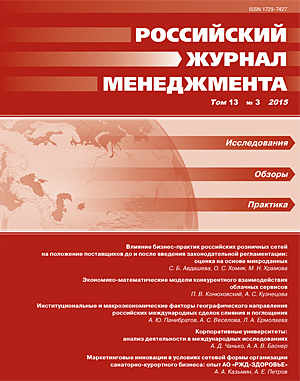The Impact of Russian Retail Chains Business Practices on Suppliers Performance Before and After the New Legislative Regulation: Microdata Assessment
Abstract
The impact of contractual arrangements in the retail sector on suppliers, as well as the consequences of the regulation imposed by the Russian Federal Trade Law, remain controversial. The article aims to empirically assess the trends in payments of Russian suppliers to retailers and their operational performance, along with the concentration of production in 2006–2012. The results are contradictory. Since the enactment of the Federal Trade Law business expenses of the food sector companies, with a significant share of payments to retailers, have caught up with the expenses of the non-food sector enterprises. Moreover, there was the relative growth of the large suppliers expenses compared to the smaller ones. Although the current studies usually interpret such a redistribution of expenses as a potential source of monopolization, we did not receive any support to the idea that the growth of modern retail formats in regional markets is accompanied by driving out of smaller suppliers.
Keywords:
retail sector, Federal Trade Law, vertical restraints
Downloads
References
Translation of references in Russian into English
Downloads
Published
How to Cite
Issue
Section
License
Articles of the Russian Management Journal are open access distributed under the terms of the License Agreement with Saint Petersburg State University, which permits to the authors unrestricted distribution and self-archiving free of charge.





